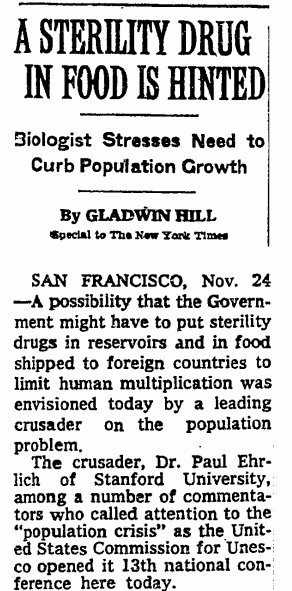Population panic
A fascinating history in old news report footage.
 This captivating New York Times "Retro Report" was shared again recently on the site's learning network. For those, such as myself, not old enough to remember the historic news reports it shares, it makes fascinating, sometimes chilling, viewing and is worth a re-visit.
This captivating New York Times "Retro Report" was shared again recently on the site's learning network. For those, such as myself, not old enough to remember the historic news reports it shares, it makes fascinating, sometimes chilling, viewing and is worth a re-visit.
The Times asks the following discussion questions in relation to the clip:
* Why do you think some scientists’ fears of global overpopulation found a receptive audience in the media, the public and even among world leaders? What evidence did the scientists have to support their predictions of mass starvation?
* Do you agree with Dr. Ehrlich that the rising global population still represents a catastrophic threat? Or any level of threat to human progress and sustainability?
* Or, do you think population stagnation or reduction, like Japan and Germany currently face, actually presents a greater challenge in the future?
Development economist Gita Sen, of the Centre for Public Policy at the Indian Institute of Management Bangalore, comments in the video that it was easier in the 1970's for elite and middle class Indians to believe that poverty lay with too many children, rather than an unequal distribution of resources or an unfair economic system, and so buy in to the population panic which spread through the world at that time. Adrienne Germain, President Emrita of the International Women’s Health Coalition and once a strong Ehrlich supporter, adds that if you start with the premise that children are a problem then it is inevitable that governments will begin to devise coercive population control strategies. Indeed, forcible sterilisation policies were implemented in response to the panic and coercion still continues today.
Biologist Paul Ehrlich’s well-known predictions were of calamity and starvation within a few short decades. However, he failed to take new farming methods, new food production technologies and range of other factors into account. Gita Sen comments insightfully of the former butterfly biologist that “there is a tendency to apply to human beings the same sort of models that may apply for the insect world. The difference is, of course, that human beings are conscious beings and we do all kinds of things to change our destiny.” Conversely, the problems many countries now recognise they face today are over-consumption, obesity and too few people. Watch the report and consider the questions above for yourself here:

Today we begin a series of four articles by Denyse O'Leary on an ancient practice which appears to have become in some quarters the mental equivalent of fast-food, hence "McMindfulness". Evidently there is a "market" for meditation, and the appeal of a method to calm and centre the mind is understandable in a distracting and distracted world. But not all methods are equally helpful, and, even if they were, being obliged to practice one of them -- either by the company CEO or the local school authority -- would surely be a dangerous thing. Anyway, that is the issue Denyse puts before us today.
Submissions on books about heroes of conscience have closed and we will present some results in a day or two. Thanks to those who contributed.

Carolyn Moynihan
Deputy Editor,
MERCATORNET
 | A thoughtful response to the McMindfulness fad
Denyse O'Leary | ABOVE | 18 April 2016
|
 | Bernie Sanders’ Rome adventure
Sheila Liaugminas | SHEILA REPORTS | 18 April 2016
|
 | Official Europe’s topsy-turvy social priorities
Chiara Bertoglio | FEATURES | 18 April 2016
|
 | Population panic
Shannon Roberts | DEMOGRAPHY IS DESTINY | 18 April 2016
|
 | Growing Up: Tevye and the Jews
Susan Reibel Moore | READING MATTERS | 18 April 2016
|
Suite 12A, Level 2, 5 George Street, North Strathfied NSW 2137, Australia
Designed by elleston
New Media Foundation | Suite 12A, Level 2, 5 George St | North Strathfield NSW 2137 | AUSTRALIA | +61 2 8005 8605










.png)



























No hay comentarios:
Publicar un comentario